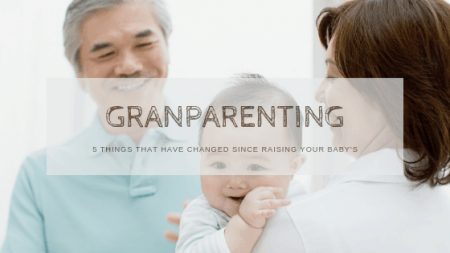
Becoming a grandparent is an exciting adventure!
Something a lot of parents look forward to is watching their children grow up and build beautiful families of their own. Becoming a grandparent is a wonderful transition in life. It creates a new lens to view your children through when you begin to see them now as parents. You become the expert, having lived, and survived early parenthood. A source of support and knowledge to rely on when times are tough as your children wade through late nights, lack of sleep and endless self-doubt.
Becoming a grandparent is the ultimate rite of passage.
Having raised your own children, you have endless patience for crying babies, dirty diapers and spit up. Knowing that your role is that of support and love and not a full-time caregiver of the new family addition.
As a new mom, I often turned to my mother and mother-in-law for advice on all things baby and parenting. I relied on the expert advice of family, having lived the experience of parenting and doing a pretty fine job raising myself and my husband (in my opinion). That being said, it was sometimes difficult to discuss things that had changed since I was young. Many conversations started with “well in my day”, or “we did it this way and you survived”. Being a labour and delivery nurse as well as a childbirth educator it was hard to reconcile, things I knew were evidence-based, or that had changed since our parents raised us, based on new research or expert advice. I know it was never the intention of anyone to disagree. So, in hopes of future families avoiding the same issues, I’d like to share a few things with new and expecting grandparents that have changed since we were young.
I have always believed that knowledge is power. And how wonderful it would be for Grandparents to support and help their children blossom into amazing parents themselves, by already having the best, up-to-date advice to give. So here goes:
5 things that have changed since you raised your kids:
- Parents are now taught that babies are to sleep on their backs. This is very different than what my parents were taught and truthfully the recommendations on this have changed a few times in the last 30 years. However, in the early 1990’s the “Back to Sleep” campaign was launched, based on new research that highly associated tummy and side sleeping with sudden infant death syndrome (SIDS). The research on this is pretty solid that the safest position for a baby to sleep in is on their back. This allows their airway to remain open and prevents suffocation.
- Swaddling is no longer recommended at bedtime. I know this sounds crazy! And by no means am I saying swaddling is bad, or don’t do it. However, swaddling a baby at bedtime, when no one is awake and attentive to the baby’s needs is dangerous. It is actually far more dangerous for a baby to be too warm at night than too cool. Swaddling at night can cause a baby to overheat and again increase the risk of SIDS. So, the general rule is, swaddling for comfort is great, but not at bedtime. This brings me to my next point.
- No blankets on the baby in bed. Again, I know this sounds CRAZY. But for the same reasons above, it is far more dangerous for a baby to be too warm than a little cool. The recommendation from Health Canada and Public Health is to dress the baby in 2 layers of clothing. A diaper shirt (onesie) with warm pyjamas on top. There should be no blankets, toys, pillows or bumper pads in the baby’s sleep area. All of these items are associated with a higher instance of SIDS.
- Baby shouldn’t sleep in their car seats outside of the car. I know my mom was told to NEVER move a sleeping baby. However, infant rear-facing car seats are meant to be kept in the vehicle at an incline. When you remove these “bucket” seats from their base and put them on the floor, they no longer retain that angle, which actually makes it easy for the baby to tilt their head forward and obstruct their own airway.
- Infant feeding recommendation has changed drastically since I was young. The recommendation to introduce cereals very early (2 or 3 months) and move on to other pureed baby foods has been highly associated with allergies and food intolerances. Health Canada and the World Health Organization now recommend not starting solid foods until a baby is at least 6 months of age. This allows the baby’s digestive system to be mature enough to actually process food and extract nutrients from it. In fact, lots of parents are opting not to feed their baby cereals or purees at all! Many parents opt to introduce complementary foods by a method called “Baby Led Weaning”. BLW is a style of feeding that introduces whole foods, like chunks of sweet potato or wedges of avocado as a first food.
I hope these tips help to support and encourage positive conversations between new grandparents and their children. It is so important that everyone can blossom and grow within the family together.
Enjoy every smile, every giggle, and every step.
Happy Grandparenting!
